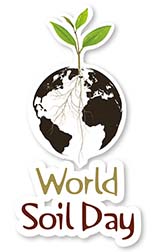Join the California Department of Food and Agriculture and our many partners in highlighting soil health! Bookmark this page and check back often. For more information about CDFA's Healthy Soils Program.
Why Healthy Soils?
Healthy soil is quite literally the foundation of sustainable food, water, air and biodiversity. Restoring and preserving healthy soil results in:
- Improved plant health and yields
- Increased water infiltration and retention
- Sequestered carbon and reduced greenhouse gases (GHGs)
- Reduced sediment erosion and dust
- Improved water and air quality
- Improved biological diversity and wildlife habitat
Calendar of Events
Saturday, December 2

INTRO TO COMPOSTING: Hot pile or worm bin
Hosted by the UC Master Gardeners of Sonoma County
Healdsburg Regional Library, 139 Piper Street, Healdsburg, CA 95448
Discover the basics of composting and worm composting, and find a system that's right for you.

Video: CDFA Secretary Karen Ross kicks off Healthy Soils Week 2023
Secretary Karen Ross, with the California Department of Food and Agriculture, welcomes Healthy Soils Week 2023. CDFA is joined by key agricultural stakeholders and the agency is set to celebrate and raise awareness about the critical role healthy soils play in shaping a more sustainable agricultural future.
Tuesday, December 5

Video: Healthy Soils at the Root of Farming Success
Scott Park is a builder of healthy soils, and a successful, long-time organic farmer in Meridian, California (Sutter County. He's working with a range of crops, including corn, processing tomatoes, rice, among other crops. Scott's approach to nutrient management is focusing entirely on keeping the soil healthy, which also helps increase water holding capacity and infiltration rates and increase soil fertility. Park Farming focuses on rotational cropping, cover crops, and using organic soil amendments.

Video: Los Cinco Principios de la Salud del Suelo
Los agricultores en todo el mundo operan en una era de clima incierto. Los suelos sanos y vivos pueden soportar mejor la creciente demanda que les estamos imponiendo para cultivar alimentos saludables y mantener el agua y aire limpios bajo estas imposiciones climáticas. Es importante construir y mantener la salud del suelo antes de que aparezcan los síntomas del cambio climático como son las sequías o inundaciones. Los suelos saludables pueden resistir mejor estas tensiones. Martín Guerena, Especialista en Agricultura Sostenible con el Centro Nacional de Tecnología Apropiada, en Davis, California, ayudó a capacitar a un grupo de agricultores durante la conferencia anual de California Small Farm en Paso Robles.
Para más información sobre el Programa de Healthy Soils/Suelos Saludables de CDFA, visite: https://www.cdfa.ca.gov/oefi/healthysoils/

Cover Cropping and Livestock Grazing for Regenerative Viticulture
The Community Alliance with Family Farmers (CAFF) will conduct a free, in-person event on December 5 from 10 am – 1 pm, at the LangeTwins Family Winery and Vineyard in Acampo. Funded by CDFA's Biologically Integrated Farming Systems Programs (BIFS) program, the event will include discussion about cover cropping and integrated livestock grazing in vineyards as part of a systems approach to land management.
Update: Read more about this event on CDFA's Planting Seeds blog.
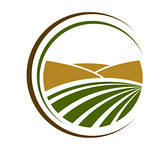
California Climate and Agriculture Network (CalCAN) Climate Solution Webinar
California Climate and Agriculture Network (CalCAN) Climate Solution Webinar will provide information about technical assistance needs to support on-farm climate resilience and healthy soils practices as part of a series related to their new Climate Platform for California Agriculture report.

Virtual Event: Cultivate Healthy Soil in Your Garden
The University of California Master Gardeners of Ventura County will conduct a free virtual workshop about the importance of healthy soils and how to create healthy soils in your own backyard. Understand the ways each essential plant nutrient contributes to a healthy plant and how to make these nutrients available for plant uptake. Taught by Emma Volk, UC Cooperative Extension Production Horticulturalist, Santa Barbara and Ventura Counties.
Wednesday, December 6th
Public Listening Session: Defining Regenerative Agriculture for State Policies and Programs
The California Department of Food and Agriculture, in collaboration with State Board of Food and Agriculture, will be hosting the first of five public listening sessions to receive comments that will help define "regenerative agriculture" for state policies and programs.

Sustainable Conservation released: "Collaborative Solutions for California's Climate-Resilient Agriculture: Harnessing the Water-Related Benefits of Soil." The report looks at the relationship between healthy soils and water, and the barriers to soil health practices in California.
Fridayy, December 8th

Sustainable Nutrient Management and Soil Health Field Day in Salinas
University of California Cooperative Extension (UCANR) is offering a Sustainable Nutrient Management and Soil Health Field Day in Salinas on Friday, December 8. They will cover water and nitrogen use efficiency, Ag Order 4.0 updates, remote irrigation monitoring, and soil carbon management with field sensors.
For more information, please contact Cole B. Smith at cbrsmith@ucanr.edu.
Public Listening Session: Defining Regenerative Agriculture for State Policies and Programs
The California Department of Food and Agriculture, in collaboration with State Board of Food and Agriculture, will be hosting the first of five public listening sessions to receive comments that will help define "regenerative agriculture" for state policies and programs.
Additional Healthy Soils Resources

NRCS Videos: a "Soil Tunnel," an in-field soil health assessment, and a rainfall simulation all bring home the importance of what goes on below the soil surface.
- A Walk Through the Soil Tunnel (5:06 min.) The Soil Tunnel is an educational tool designed to teach and promote the importance of soils and soil health. It illustrates through the use of images, the important functions of the soil. Through this interactive soil exhibit, audience of all ages can view the world below the ground by walking through the Tunnel.
- NRCS Cropland In-Field Soil Health Assessment Overview, Part 1 (17:58 min.) The Cropland In-Field Soil Health Assessment is designed to be used as a diagnostic tool to help conservation planners determine if soil health resource concerns exist.
- NRCS Cropland In-Field Soil Health Assessment Overview, Part 2 (16:35 min.) (see above for description)
- NRCS Rainfall Simulator Demo (10:29 min.) The Rainfall Simulator provides a demonstration of how practices such as no-till farming, cover crops, and prescribed grazing benefit soil health and improve the water cycle on cropland and rangeland. Presented by Dr. Zahangir Kabir, NRCS Regional Soil Health Specialist.
- NRCS-RCPP announces funding is available for San Joaquin Valley farmers to implement 14 conservation practices that save water and build healthy soils. American Farmland Trust has information about what’s covered, and where to get more help in multiple languages.
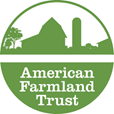
American Farmland Trust is documenting economic and environmental benefits of soil health practices with farmer profiles, case studies, webinars, and on-farm soil analysis trials with almonds, mixed crops, wine grapes, and wheat.
American Farmland Trust’s farmer profiles document how vineyards in Napa and Sonoma Counties boosted their bottom line by thousands, increased their biodiversity significantly, and reduced their water usage by approximately 40 percent with various soil health
Soil Health Bottom Line
To understand how soil health improves California producers' economic and environmental impacts, AFT offers case studies, farmer profiles, quantification tools, and other resources in its Soil Health Bottom Line program. Learn about the multi-year, in-field trials and how that information is shared with the agricultural community. Learn More.
The Dirt about Biochar
Could a stable, high-carbon soil amendment called "biochar" help improve soil health, mitigate climate change, and protect our food supply? Learn more about this soil amendment, as well as two
USDA-NRCS funding opportunities to adopt biochar on California farm operations. Read Post.
Farmer Funding for Conservation Practices
Technical support and funding for farmers to implement land and water conservation practices in Tulare, Fresno, Madera, Merced, and Stanislaus counties is available, thanks to a collaboration between AFT, USDA-NRCS, and local conservation districts. Apply before January in multiple languages. More Details.

Almond Board of California (ABC) promotes cover crops with a case study of one orchard in Stanislaus County, where cover crops have been planted for a decade. The study demonstrates return on investment, based on a calculator system developed by the American Farmland Trust.

Sustainable Conservation's Solutions in our Soils Webinar Series brought together experts from across California for four rich and far-reaching conversations that covered what soil health means and why it's so important for increasing drought resilience, improving water quality, boosting biodiversity, and nourishing healthy farmlands and communities.
Soil health has the potential to play an outsized role in conserving and protecting California's valuable water resources, which is at the core of our work. This report represents an analysis of the barriers preventing California's growers from implementing soil health practices and solutions to address them.
Coming soon! A new report examining cover cropping in the Sustainable Groundwater Management Act (SGMA) era. This report will examine how this multi-benefit practice can improve SGMA outcomes in water-scarce regions and the barriers that might hinder this potential.
"Collaborative Solutions for California's Climate-Resilient Agriculture: Harnessing the Water-Related Benefits of Soil." The report looks at the relationship between healthy soils and water, and the barriers to soil health practices in California.
Healthy Soils Videos
Loading...
Loading...
Partners
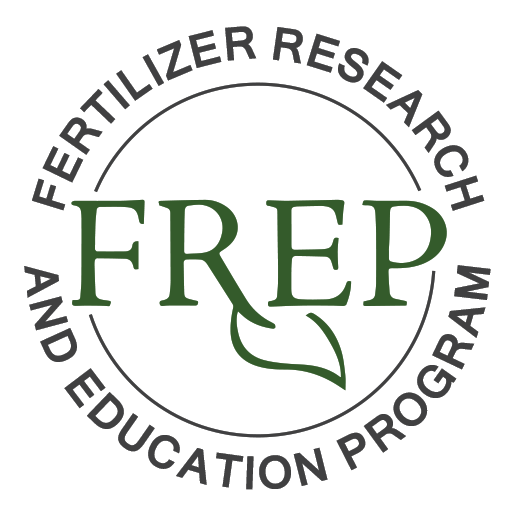 CDFA's Fertilizer Research and Education Program (FREP) funds and facilitates research to advance the environmentally safe and agronomically sound use and handling of fertilizing materials.
CDFA's Fertilizer Research and Education Program (FREP) funds and facilitates research to advance the environmentally safe and agronomically sound use and handling of fertilizing materials.

The USDA Natural Resources Conservation Service has provided leadership in a partnership effort to help America's private landowners and managers conserve their soil, water, air, plants, and other natural resources since 1935. For more information about NRCS in California, please visit the NRCS website.
Community Alliance with Family Farmers (CAFF) conducts on-farm research, facilitates farmer-to-farmer learning, and provides technical assistance for a variety of climate smart farming practices. Check out the latest case study on cover crops in orchards.
The California Foundation for Agriculture in the Classroom is a nonprofit organization dedicated to educating youth throughout California about the importance of agriculture in their daily lives.
CalRecycle's mission is to protect the environment and preserve natural resources by promoting and supporting the highest levels of waste reduction, recycling, and reuse.
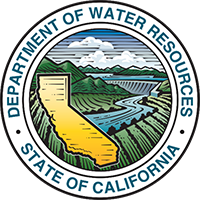
The Department of Water Resources manages California's water resources, systems, and infrastructure, including the State Water Project (SWP), in a responsible, sustainable way.
University of California Agriculture and Natural Resources (UCANR) brings UC information and practices to all 58 California counties. Through research and Cooperative Extension in agriculture, natural resources, nutrition, economic and youth development, our mission is to improve the lives of all Californians. Learn more at the UCANR website.
The National Center for Appropriate Technology (NCAT) facilitates meaningful connections among sustainable agriculture producers, renewable energy experts, innovators, researchers, and industry professionals. Learn more at the NCAT website.
Sustainable Conservation advances the collaborative stewardship of California's land, air, and water for the benefit of nature and people. The organization launched its Solutions in Our Soil program in 2023 to explore how improving the state's soil health can address community, agricultural, and environmental water challenges.
Infographics
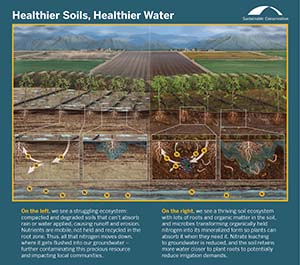
Healthier Soils, Healthier Water
Enlarge or print this infographic highlighting the connection between soil and water.
Illustration: SayoStudio.
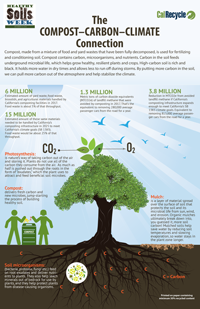
Healthier Soils, The COMPOST-CARBON-CLIMATE Connection
Enlarge or print this infographic explaining the connection between compost, carbon and the climate.
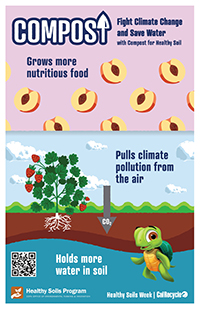
COMPOST for Healthy Soil
Enlarge or print this infographic explaining why compost for healthy soil.

